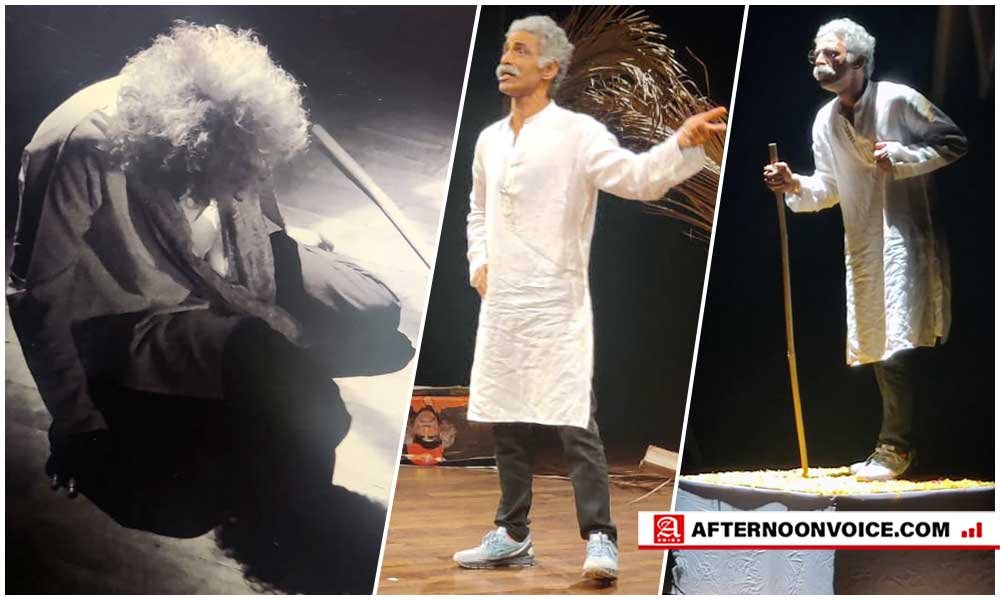
‘Gandhi’ was a really good concept and children can really enjoy the play whereas this can be a little uninteresting for the adults. The play begins with a Bahubali who believes in violence and then the narration of his ‘Lathi’ embarks Gandhi into the play.
For more than 40 minutes the play was like an interactive History class, with the learning from Mahatma Gandhi’s three monkeys, their names. (In Japanese Shintoism, the three monkeys are – Mizaru who sees no evil; Kikazaru, who hears no evil; and Iwazaru, who speaks no evil.) From here Makarnd takes you to Gandhi’s childhood memories, (if you have read Experiments with Truth: Mahatma Gandhi, the Child Delinquent, you may get exactly what the director and actor want to convey), but if you have not read the book the message goes wrong.
While explaining what made young Gandhi smoke a beedi and eat meat, “Makarand emphasizes “Aaati Ghanishtha Mitrata, Anishtha Ho Jati Hai, Isliye Kisise Jyada Ghanishtha Mitrata Nahi Karna”. A couple sitting beside me was whispering, “bachpan me to sab stupid harkat karte hai”. How do those innocent moments set the moral parameters for a good friendship? (Thankfully the audiences were adult enough to understand what he wanted to convey).
The Baahubali comes in contact with a poet and the poet makes him understand Mahatma Gandhi’s notions of non-violence and peace, which start impacting the strongman’s thoughts and actions. The play was all about the conflict between violence and nonviolence, in the Baahubali, since he feels himself changing once he starts guzzling the non-violent way of life, but can’t quite let go of his destructive side. He eventually surrenders, meaning that even though Gandhi was shot dead in 1948, in a way, he survives through this man.
In this play the Baahubali is an allegory for all those who are ruling with power and not with empathy,” Deshpande explains, adding, “If they think that war will create peace, it will not. It will merely create another war, with peace prevailing [as an illusion] only in the overriding period while the next one is planned.” He beautifully enacted peace and non-violence that notions propagated by the Father of the Nation — still relevant in an age where people commit violent acts.
In between these conversations, Makarand takes on the role of the narrator, describing tiny titbits of history. Whether it is the origins of the three monkeys of Mahatma or the stories behind the charkha, the chulha, the lathi and his satyagraha — things usually relate with the Mahatma.
No doubt Makarand Deshpande is one of my most favourite actors, but in this play, he hardly had any scope to perform. The best part is that throughout the play Makarand interacts with the audience directly. There are references and not-so-subtle hints directed at the current political situation as well as the ongoing pandemic. There was mention of why people are more inclined to Pushpa but not 83 movies; He trolled his audiences with humour that really makes you laugh. Then he abruptly roams across the stage and returns to make his point.
Overall, it was a good play but I highly recommend it for young adults and youth. Every school should arrange this show for their students. Sound and lights bring life to the performance. Especially the light work at the end of the show, where Gandhi was displayed on the wall makes people all of sudden patriotic and emotional. Gandhi was relevant yesterday and is so today as well. As the world turns progressively violent in its thoughts and actions, the Father of the Nation will continue to remain relevant.
It is to Makarand’s credit that he drives in this message of ahimsa without resorting to lengthy dialogues and boring speeches. Makarand Deshpande has written, directed and acted in this solo act.

